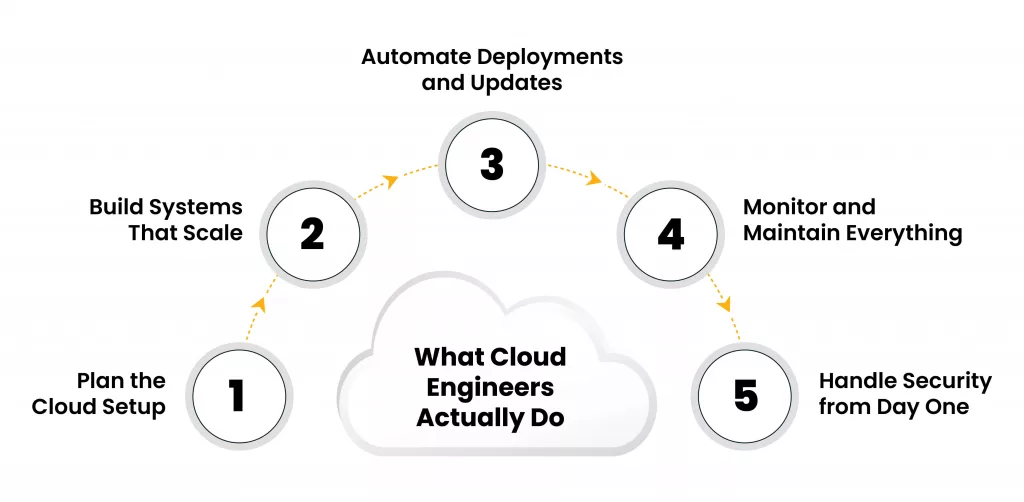Many businesses move to the cloud expecting speed, flexibility, and lower costs but end up facing problems like:
- Performance issues
- Downtime
- Growing bills, they can’t explain
The issue isn’t the cloud—it’s how it’s been set up and what’s (not) being done to manage it. Cloud systems don’t run themselves. Hence, if you want them to be secure, stable, and effectively support your day-to-day operations, someone needs to design and maintain them properly to keep them running smoothly.
That’s where cloud engineers come in.
So, let’s see what is cloud engineering and how it can make a difference to your business.
So, What is Cloud Engineering?
It’s all about designing, building, managing, and fine-tuning systems that live in the cloud. Cloud engineering typically supports things like:
- Your website – keeping it stable, fast, and available
- Mobile apps – making sure they scale and stay updated
- Internal tools – so your team can work without disruption
- Customer platforms – everything from portals to payment systems
Why More Businesses Are Turning to Cloud Engineering Services
The cloud gives businesses 3 major things:
- Flexibility
- Speed
- The chance to save money
But if it’s not set up correctly, it can also lead to confusion, wasted resources, and performance issues. As a result, many businesses are now choosing to work with professionals who offer cloud engineering services.
Cloud engineers help you avoid problems like:
- Paying for unused or underused resources
- Security gaps in cloud configurations
- Downtime during software updates
- Long delays in setting up or scaling new systems
Businesses that utilize cloud engineering services often experience faster rollouts, improved reliability, and easier compliance with requirements.
Cloud engineering services are not just for large corporations. Small and mid-sized businesses benefit just as much, especially if they are working with limited technical staff or looking to grow without making big investments in hardware.
What Cloud Engineers Actually Do

1. Plan the Cloud Setup
They design how your infrastructure should look. That includes choosing the following:
- Where data lives
- How data is protected
- How your systems interact with the data
This planning is essential if you’re migrating from on-premises to the cloud or switching cloud platforms.
2. Build Systems That Scale
If your website crashes every time traffic spikes, it’s probably not built for scale. Cloud engineers create systems that grow with your business. Whether you need to serve 1,000 users or a million, the same foundation can support you.
3. Automate Deployments and Updates
Manual updates and bug fixes can be time-consuming and often result in errors. Cloud engineers automate this process using tools like Terraform, GitHub Actions, and CI/CD pipelines, allowing your teams to release changes safely and quickly.
4. Monitor and Maintain Everything
Cloud engineering isn’t a one-time job. Engineers continuously monitor systems, check for errors, apply patches, and look for ways to reduce costs. Such continuous efforts matter when running complex applications or managing high traffic.
5. Handle Security from Day One
Many cloud-related breaches occur due to poor setup. Cloud engineers apply security best practices right from the start—things like encrypted databases, secure user roles, access control, and regular audits.
Moreover, they also work with compliance frameworks if your company operates in a regulated industry, such as finance or healthcare.
What Makes a Good Cloud Setup for Business?
Not all cloud solutions are the same. A well-built cloud system should be:
- Fast: Loads quickly and responds instantly
- Flexible: Easy to change or expand
- Secure: Keeps data safe from internal and external threats
- Cost-Efficient: You only pay for what you use
- Reliable: Uptime is high, with minimal disruptions
Many businesses discover that their cloud systems look good on paper but fail under real-world pressure. Without proper cloud engineering, even the best cloud platforms can fall short of expectations.
This is where experienced engineers come in. They make sure that your cloud environment is not only stable but also aligned with your business goals.
Signs You Need Cloud Engineering Help
| Problem Your Team Faces | What a Cloud Engineer Can Do |
| Regular system crashes | Build systems with auto-scaling and failover |
| High monthly cloud bills | Audit usage and optimize cost |
| Slow deployments | Set up CI/CD pipelines |
| Weak security policies | Enforce encryption, IAM, and monitoring |
| Difficulty in migrating data | Plan and execute cloud migration safely |
Even if your business has already started using the cloud, that doesn’t always mean it’s working well. Many companies turn to cloud engineers after facing downtime, poor performance, or unexpected ballooning costs.
Common Questions from Businesses
Do we need cloud engineering if we already use a cloud provider?
Yes. These platforms provide the tools, but you still need someone who knows how to use them properly. That’s what cloud engineers do. They ensure your setup is tailored to meet your specific business needs.
Can cloud engineering services help us save money?
Absolutely. Many businesses overspend on the cloud simply because they don’t know how to configure their resources efficiently. Engineers can identify and resolve these issues, often resulting in a 20%–30% reduction in costs within months.
Is this only useful for tech companies?
Not at all. Retailers, healthcare providers, logistics companies, and financial firms all use cloud engineering to power online portals, apps, internal tools, and customer-facing systems.
The Different Types of Cloud Engineering Work
There are two main types of cloud engineering businesses often need:
- Infrastructure Engineering: This focuses on the core cloud setup—things like virtual machines, networking, databases, and security. It’s essential when you’re building or expanding your digital operations.
- Application-Level Engineering: This focuses on the tools and software your team or customers actually use. These engineers make sure apps run smoothly, update automatically, and are easy to scale.
Your business may need both or just one, depending on your goals. However, if you’re launching a new product, app-focused engineering may be the first consideration. But on the contrary, if you’re restructuring internal systems, infrastructure work may be more critical.
Hence, understanding the types of cloud engineering helps you make informed decisions about hiring or outsourcing.
Many businesses employ a hybrid approach, using in-house staff for daily tasks and outsourcing expert services for setup and audits.
What to Look for When Hiring Cloud Engineering Services
If your business is considering hiring a service provider, here are a few things to check:
- Experience with your cloud platform (e.g. AWS, Azure, GCP)
- Ability to work with existing systems & tools
- Clear communication about cost control and security
- A track record of solving business-specific problems—not just technical ones
Good cloud engineering services won’t overwhelm you with jargon. They’ll ask about how your business works, what your goals are, and what kind of problems you’re facing. From there, they’ll suggest a plan that fits—not a one-size-fits-all solution.
Hire Professionals and Go from Cloud Chaos to Cloud Confidence Today!
At Cygnet.One, we focus on building cloud environments that actually work for your business—not just on paper. Our professional cloud engineering services are designed for the following:
- Simplify the complicated stuff
- Cut down waste
- Keep your systems secure and running smoothly
Are you trying to fix constant issues? Maybe reduce cloud costs? Or planning a full transformation? Our team brings the experience and tools to get you there.
We provide clear solutions that match your goals and pace. Let’s make your cloud setup work the way it’s supposed to.
Let’s talk today.

































